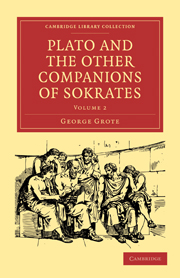CHAPTER XXV - PARMENIDES
Published online by Cambridge University Press: 05 October 2010
Summary
Character of dialogues immediately preceding—much transcendental assertion. Opposite character of the Parmenides
In the dialogues immediately preceding—Phædon, Phædrus, Symposion—we have seen Sokrates manifesting his usual dialectic, which never fails him: but we have also seen him indulging in a very unusual vein of positive affirmation and declaration. He has un-folded many novelties about the states of pre-exist ence and post-existence: he has familiarised us with Ideas, Forms, Essences, eternal and unchangeable, as the causes of all the facts and particularities of nature: he has recognised the inspired variety of madness, as being more worthy of trust than sober, uninspired, intelligence: he has recounted, with the faith of a communicant fresh from the mysteries, revelations made to him by the prophetess Diotima,—respecting the successive stages of exaltation whereby gifted intelligences, under the stimulus of Eros Philosophus, ascend into communion with the great sea of Beauty. All this is set forth with as much charm as Plato's eloquence can bestow. But after all, it is not the true character of Sokrates:—I mean, the Sokrates of the Apology, whose mission it is to make war against the chronic malady of the human mind—false persuasion of knowledge, without the reality. It is, on the contrary, Sokrates himself infected with the same chronic malady which he combats in others, and requiring medicine against it as much as others. Such is the exact character in which Sokrates appears in the Parmenides: which dialogue I shall now proceed to review.
- Type
- Chapter
- Information
- Plato and the Other Companions of Sokrates , pp. 263 - 318Publisher: Cambridge University PressPrint publication year: 2010First published in: 1865



